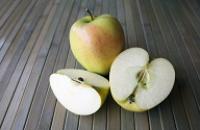
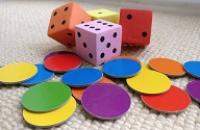
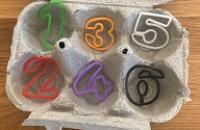
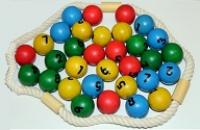
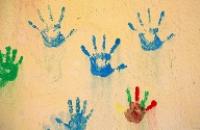
Children often enjoy saying how they see something differently from someone else.
Adults could show interesting arrangements of objects and invite children to talk about the numbers they see.
The Activity
Arrange five large magnets on a tin tray and confirm that everyone sees five. Ask, 'What numbers can you see hidden inside five?' Collect different views. Turn the board away to rearrange, show briefly and ask, 'How do you see them now?'
Encouraging mathematical thinking and reasoning:
Describing
Can you tell me how you saw them?
Did anyone see them differently? How did Lucas say he saw them?
Reasoning
How did you know how many there were?
Does this way make it easier to see how many there are? Why did you find it easier?
Opening Out
Has anyone got a quicker way of counting?
Can you arrange your counters so that you can quickly see how many there are?
Recording
Can you copy this pattern with your counters?
Can you record this by drawing or stamping or with stickers?
The Mathematical Journey
Shape, space and position:
- using spatial language, like 'on the top', 'underneath' or 'left' and 'right'
Number:
- perceptual subitising and cardinality - recognising small numbers without counting
- part-whole awareness - talking about numbers being made up of other numbers and numbers within a number, e.g. "I knew there were three because there's two and there's one"
- recognising doubles, e.g. "When I see six I see three and three"
- conceptual subitising - recognising the whole number by subitising and adding subgroups, e.g. "There's two and two and one, and that makes five"
- counting in twos (unitising)
Development and Variation
Show numbers of things in less familiar arrangements and provide counters for children to copy.
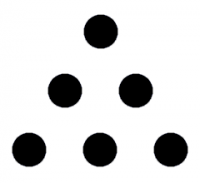

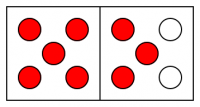
Invite children to make lots of different arrangements for five with counters, matchsticks, shapes or small cubes, and to talk about how they are made up with different numbers.
Bunny ears: ask children to show a number on the fingers of two hands held above their heads. One child can show a number briefly in this way for others to say how many there are.
Discuss images from Making Number animations (https://www.oxfordowl.co.uk/for-school/pd-books/making-numbers, you'll need to register) or Number Talks (ntimages.weebly.com).
Resources
Large magnets, magnet board or tin tray.
Video of the magnet activity with a class of five-year-olds (registration needed):
https://learn.teachingchannel.com/video/visualizing-number-combinations
Dot cards with different arrangements, as described in this article.

Counters, such as 'nuggets', square tiles or cubes.
Subitising progression with activities: http://learningtrajectories.org
Download a PDF of this resource.
Acknowledgement: Stephanie Latimer on Teaching Channel

